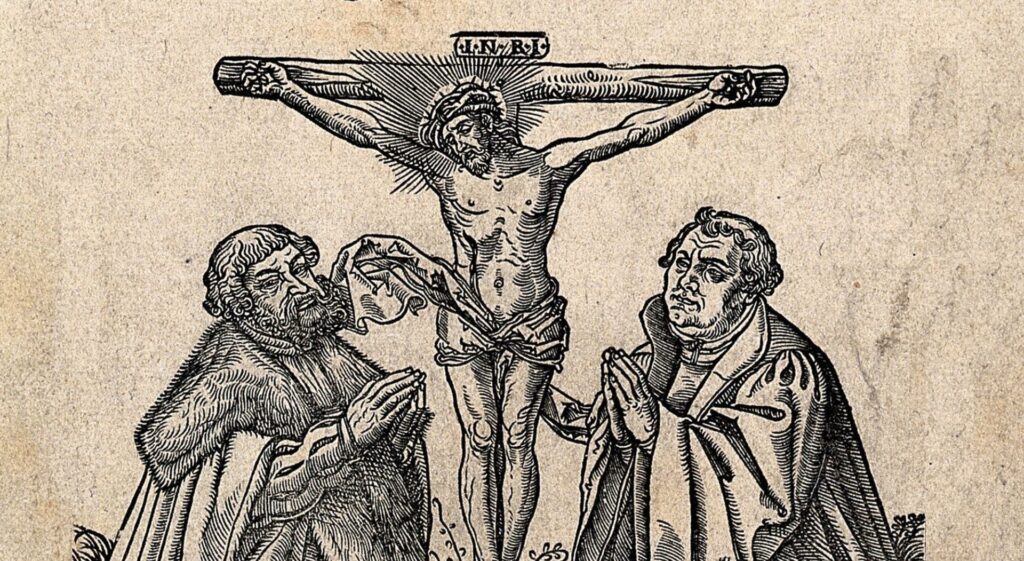A Prayer for THE FEAST OF THE HOLY CROSS – 14 September 2020
The Feast of the Holy Cross – 14 September

Collect of the Day: Merciful God, Your Son, Jesus Christ, was lifted high upon the cross that He might bear the sins of the world and draw all people to Himself. Grant that we who glory in His death for our redemption may faithfully heed His call to bear the cross and follow Him, who lives and reigns with You and the Holy Spirit, one God, now and forever. Amen
A Meditation for The Feast of St Michael and All Angels
† The Feast of St. Michael and All Angels – 29 September †
Join us this Sunday at 10 a.m.
The Feast of St. Michael and All Angels commemorates the great battle in heaven between Satan and his evil angels and St. Michael and the angels of the Lord. The readings (Daniel 10:10–14; 12:1–3; Revelation 12:7–12; Luke 10:17–20; Matthew 18:1–11) describe how the Lord used Michael and the angels to deliver His people from the accusations of Satan. Because Jesus took all of Satan’s accusations against us on Himself when He went to the cross, Satan has nothing more to say to the Lord about us or about our sins. Every evil deed, every sin, every impure thought or intention was placed upon Jesus. Now Satan is not only silenced but is cast down from heaven, never more to stand before the Lord to deliver slander or accusation against His people.
So how did St. Michael and the Lord’s angels battle Satan and his demonic forces? With supernatural fireballs and weapons of mass destruction? No. Michael and the angels used the very same weapon the Lord has given to us: the Lord’s Word and the name of God that was given to us in our Baptisms. In Jude 9, as Michael battled Satan, he said, “The Lord rebuke you.”
When Satan was cast down out of heaven, Revelation 12:11 says, “They have conquered him by the blood of the Lamb and by the word of their testimony.” Satan and his evil angels are defeated not with the sword or battle tactics as we understand war strategy, but they are defeated by the blood of Jesus and His Word.
How is Satan defeated today?
Satan is still defeated by the Word of God. Every time the Lord’s Word is preached in truth and purity, Satan is defeated. The Lord’s Word silences his mouth and casts him from heaven so he can no longer accuse you before the Lord’s throne. In Luke 10:18, Jesus said, “I saw Satan fall like lightning from heaven.” Jesus said this in response to the preaching of the 72 disciples. These disciples were sent out by Jesus to proclaim the arrival of the kingdom of God in His name. Demons were cast out and Satan’s kingdom was literally torn apart by the preaching of Christ. So it continues today. The gates of hell will not prevail against the Lord and His Church.
How should we pray?
The Feast of St. Michael and All Angels reminds us of how the Lord delivered us from the lying accusations of Satan. It shows us that the battle against Satan and his evil angels is not won by power, might, strength or numbers but, as Martin Luther’s great Reformation hymn “A Mighty Fortress” confesses, “One little word can fell him.” That one little Word is Jesus and the forgiveness He gives us.
The Lord employs His holy angels to battle Satan and to silence his mouth with the Word of God and to protect us from harm and danger. When bad things happen to us, when we have a close call and when we hear of disasters averted, we can be certain that the Lord’s holy angels were involved. And when we die, we can be certain that our Lord’s angels will take us to be with our Lord forever; their job of protecting us is not finished until we are with our Lord in eternity. For the protection of the holy angels, we can and should thank our Lord as we pray daily, “Let Your holy angel be with me, that the evil foe may have no power over me. Amen” (Small Catechism, Morning and Evening Prayer).
On this day, we remember how Scripture relates angels constantly weaving in and out of the Gospel itself. An angel announces the impending birth of Christ to Mary in person and to Joseph in a dream. An angel announces the birth of Christ as good news of great joy to the shepherds. Angels sing glory to God and peace on earth on Christmas night. Angels direct Joseph’s trip to Egypt and back. Our Lord teaches that the angels who serve the little ones constantly behold the Father’s face in heaven. Angels are present at our Lord’s Passion in Gethsemane. They announce His resurrection on Easter morning. They speak to the disciples at the Ascension. They free Peter from prison. They speak to Paul. They long to look into the mysteries that are revealed now through the Church’s proclamation. We gather with them when we worship. They appear throughout the Revelation to St. John.
The Old Testament is as replete as the New Testament with references to them. Their special task regarding believers is given in Psalm 34: 7: “The angel of the LORD encamps around those who fear Him, and delivers them.” We remember them in our morning and evening prayers when we pray to the heavenly Father, “Let Your holy angel be with me, that the evil foe may have no power over me.” We ask God to send His holy angels to accompany us along our life’s journey and know that in the end of our days, we will join them in singing His praises forever. Rev. William Weedon. Celebrating the Saints Concordia Publishing House.
† St. Michael: Q and A †
Q: Why is the archangel Michael referred to as St. Michael? I thought that only believers in Christ are called saints, on earth and in heaven.
A: Some historical and biblical background may help to explain why the archangel Michael has been remembered traditionally as St. Michael.
For centuries, Christians throughout the world have observed St. Michael and All Angels on Sept. 29. On that day in the fifth century A.D., a small basilica six miles from Rome became the first known church dedicated in honour of Michael. Observance of the feast of the archangel St. Michael gradually spread throughout the West. In regions of Europe, he was honoured as a “warrior saint,” but the origin of the specific title “saint” is obscure.
During the Reformation, Lutherans also observed the feast, but in their Confessions they rejected honouring angels in idolatrous ways, such as praying to them and worshiping or adoring them (Smalcald Articles II, ii, 2628). The Lutheran reformer Philipp Melanchthon wrote a hymn for St. Michael and All Angels titled “Lord God, to Thee We Give All Praise” that praises God for creating angels to guard and keep His “little flock” on earth” (LSB 522).
The Bible mentions the angel Michael (whose Hebrew name means “Who is like God?”) five times. In Daniel 10, he is called one of God’s “chief princes” (v. 13) who stands by God’s side (v. 21). God put him in charge of His people to protect them in times of trouble (12:1). In Jude 9, he opposes Satan, and in Rev. 12:7, he and his angels fight against Satan and his cohorts. In Jewish writings around the time of the New Testament, Michael played a prominent role as the protector of God’s people.
Calling Michael “Saint” likely has something to do with our understanding of the word holy in Scripture. The word holy, in a basic sense, refers to those who are dedicated to God and consecrated to His service. The Old Testament and a passage in the New Testament call angels “holy ones” (Deuteronomy 33:2;Psalm 89:5, 7; Jude 14). Interestingly, the King James Version translates the phrase “holy ones” as “saints.” The English word saint derives from a Latin word meaning “to make sacred.” And, of course, the term saint is applied not only to angels but to God’s people as well since they are a “holy people,” the objects of God’s forgiving love and chosen for service to God (Deuteronomy 7:6; 33:3 and numerous references in Paul’s epistles for believers in Christ).
Thus, it is proper to speak of St. Michael. We do so, however, from a perspective different than when we call Christians (living and dead) saints. Angels had an intense interest in our redemption in Christ (1 Peter 1:12), but they themselves did not need or experience it. We thank God for His holy angels, but we praise Him above all for making us holy by His justifying grace (Titus 3:47). The Lutheran Witness
† Luther’s Morning and Evening Prayers †
I thank you, my heavenly Father, through Jesus Christ, You dear Son, that You have kept me this night from all harm and danger; and I pray that You would keep me this day also from sin and every evil, that all my doings and life may please You. For into Your hands I commend myself, my body and soul, and all things. Let Your holy angel be with me, that the evil foe may have no power over me. Amen.
I thank you, my heavenly Father, through Jesus Christ, Your dear Son, that You have graciously kept me this day; and I pray that You would forgive me all my sins where I have done wrong, and graciously keep me this night. For into Your hands, I commend myself, my body and soul, and all things. Let Your holy angel be with me, that the evil foe may have no power over me. Amen.
